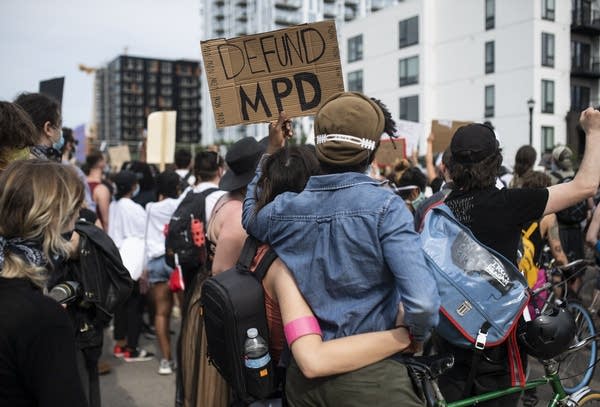Minneapolis leaders push ahead with efforts to change police

Go Deeper.
Create an account or log in to save stories.
Like this?
Thanks for liking this story! We have added it to a list of your favorite stories.
Minneapolis leaders who pledged to dismantle the city's Police Department in the wake of George Floyd's death won't achieve the type of structural overhaul to public safety they hoped for — at least not this year.
A city commission on Wednesday blocked a November vote on the issue. So now, although political will for change may be on their side, city leaders face a more incremental and challenging path to rebuilding the oft-criticized department. But they're not giving up.
"The Charter Commission blocking this question from going on the ballot will slow progress because of the way our city government is structured and the realities of municipal government," Council President Lisa Bender said Thursday. "We are still pursuing all of this other work related to investing in violence prevention and reimagining public safety. … It will not happen as quickly now."
Floyd, a Black man who was handcuffed, died May 25 after Derek Chauvin, who is white, pressed his knee against Floyd's neck for more than eight minutes as Floyd said he couldn't breathe. Floyd's death renewed calls for an end to police brutality and racial inequities, sparking protests in Minneapolis and beyond.
Turn Up Your Support
MPR News helps you turn down the noise and build shared understanding. Turn up your support for this public resource and keep trusted journalism accessible to all.
The City Council responded by proposing an amendment to the city's charter that would have replaced the Police Department with a "Department of Community Safety and Violence Prevention" that prioritized public health and a director with "non-law enforcement experience in community safety services." But the Charter Commission decided it needed more time to review the proposal, effectively keeping it off the ballot this year, though it could be put before voters in 2021.
Meanwhile, Mayor Jacob Frey, Chief Medaria Arradondo and others have been pushing ahead with other changes they say are designed to change the department's culture.
Frey said this week that the city wants to pair new police officers with "the right individuals to be role models" for field training. Another change announced last month requires officers to document their attempts to de-escalate situations, whether or not force is used.
Frey and Arradondo also have expanded requirements for reporting use-of-force incidents, ordering officers to provide more detail.
And Arradondo has withdrawn the department from union contract negotiations, saying he wants a review targeting the grievance and arbitration process that makes it hard to get rid of problem officers. Frey said the inability to fire bad officers is a "gigantic blockage in getting us to a place where we can see that necessary culture shift."
Frey also hinted that he would consider investing in public safety measures that go beyond policing when he presents the 2021 budget next week. He did not elaborate.
City Council Member Linea Palmisano said she has been working with the mayor's office on the budget, and has advocated for an independent monitor to do more audits of the Police Department.
The city recently revised its 2020 budget to address a $156 million revenue dip due to the coronavirus pandemic. In the process it diverted $1.1 million from the Police Department's $193 million budget to the Office of Violence Prevention for an outreach program geared toward those at high-risk for gun violence.
"I think in this constrained budget environment it becomes even more important to start to balance out those priorities and really start investing in prevention in a meaningful way," said Bender.
Bender said the City Council is also reviewing whether there is a more financially efficient way to respond to some 911 calls, and it's trying to get a better sense of the Police Department's staffing structure. The council is also moving ahead with a community engagement process, to get input from residents.
Don Samuels, who served on the City Council from 2003 through 2014, said one advantage the City Council and mayor have going forward is their now-more public relationship with the union. Traditionally, Samuels said, negotiations with unions are behind-the-scenes, giving unions the advantage.
"The more public the city's desires are, the more pressure there will be on the Police Department that has become out of step, not just with the city but with the nation and the world," Samuels said.
He said that whatever happens next, he hopes "cooler heads prevail."


